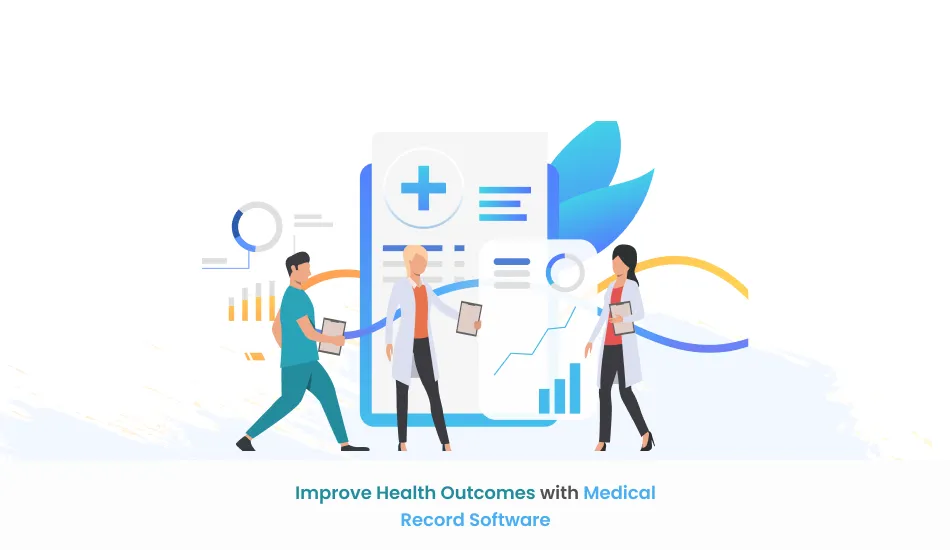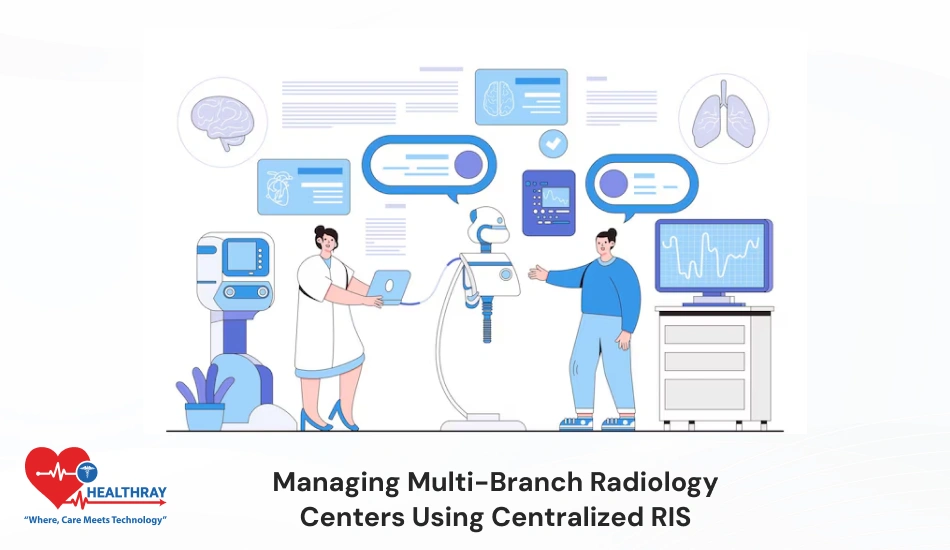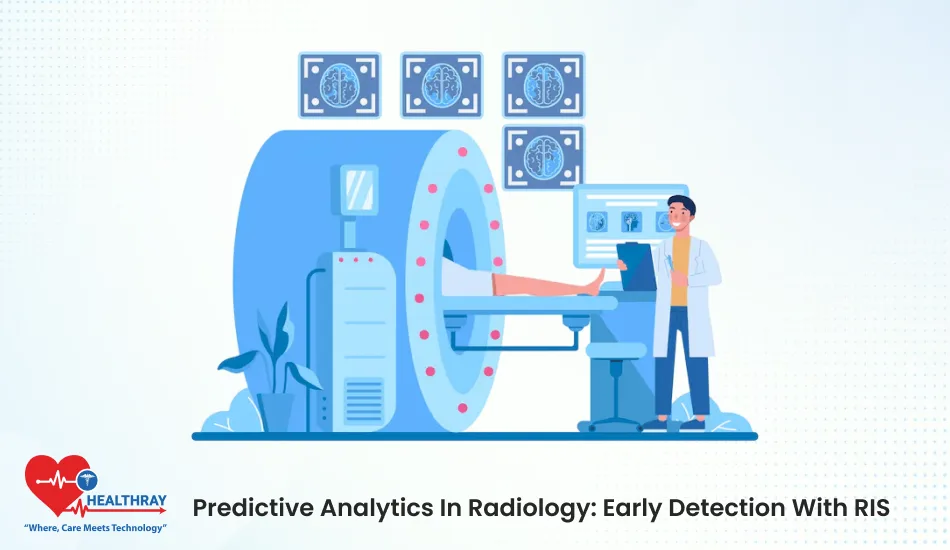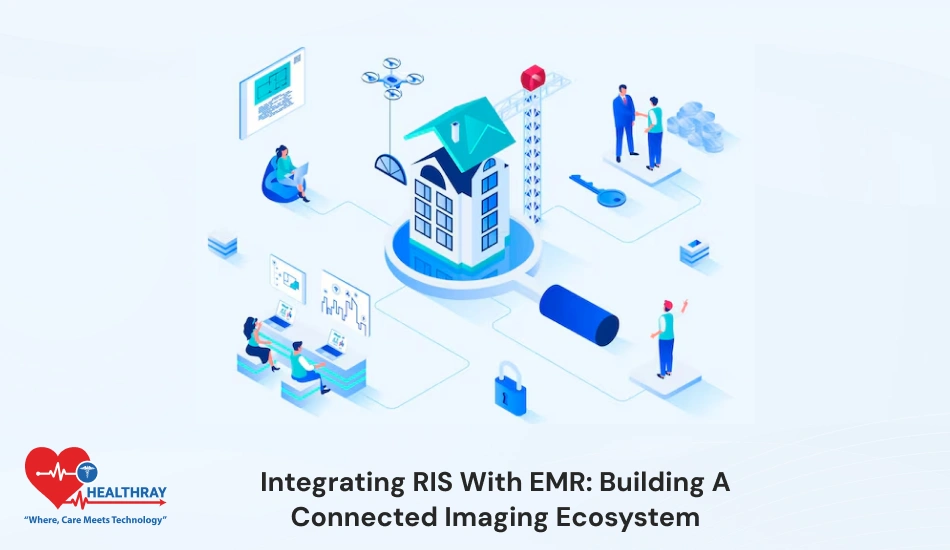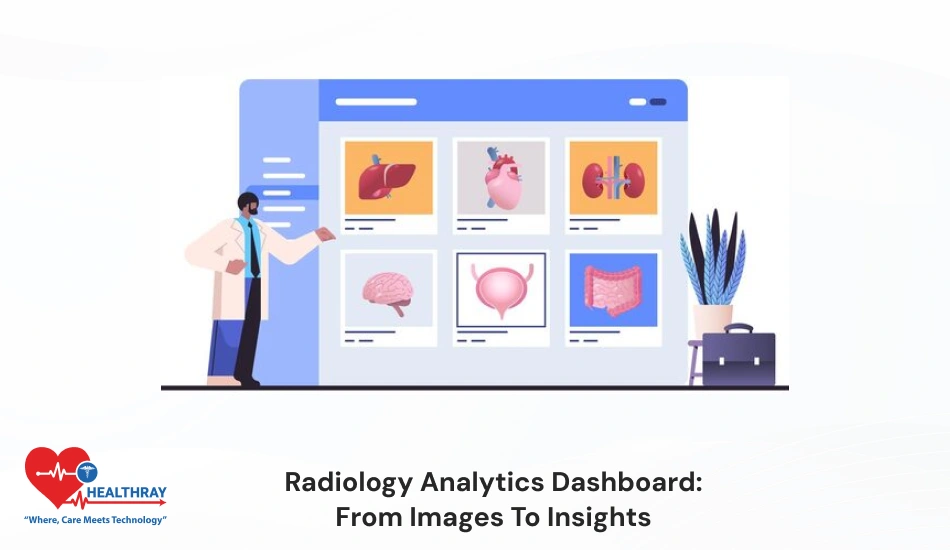Quick Summary
Medical record software is a modern technique to handle medical activities. This software has multiple attributes that improves medical data, advances clinical workflows, mitigates communication gap among internal departments, lowers replicate tasks, maintains accurate information, and improves health outcomes. Discover deeper information through this blog.
Introduction
Medical record software is a trusted medical solution that has been installing by most of the healthcare systems for modernizing their infrastructure. However, it is more than a paperless system or revolutionizing system. It simplified the patient treatment steps and supervising the revenue cycle management.
One mistake or negligence can ruin the reputation of a healthcare organization or create adverse effects on client health. Furthermore, the electronic medical record compiles documents and prepares reports impulsively. Billings are in standard format that keep away penalties and helps to retain more money in the clinical budget.
Additionally, facilitate patients with their own health platform, which allows them to do certain activities such filling medical forms, create ABHA cards, reviewing prescriptions, and editing profiles. There are multiple doctors that are registered in medical record software. Consequently, patients can choose anyone after analyzing their expertise and qualification.
Importance of Medical Record Software
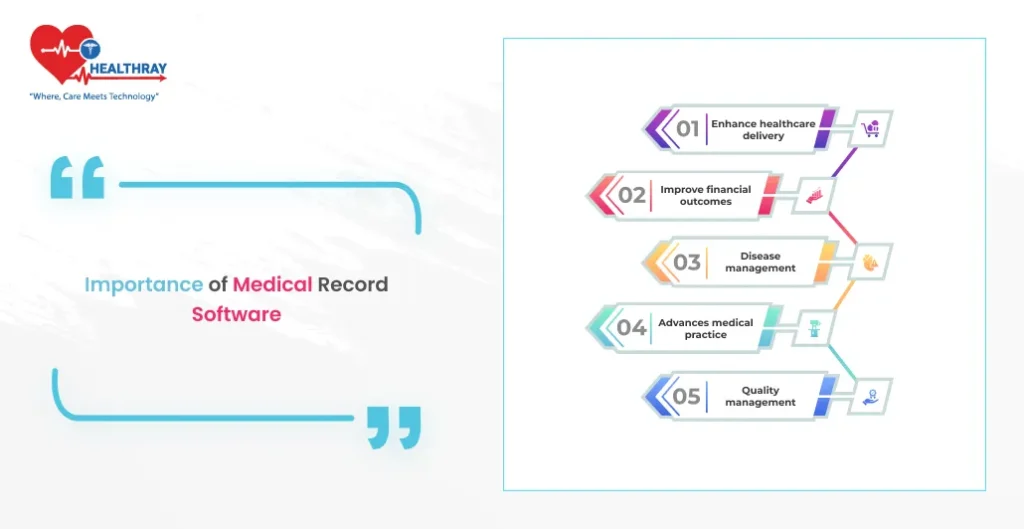
Each second is crucial, if we talk about the medical industry. One second can save a patient’s life or lose his life. Furthermore, if a patient is treated on time without delay, there are more chances to recover faster and avoid a reverse situation. Implemented EMR systems make this possible. Uncover the importance of medical record software :
Enhance healthcare delivery
Improving medical systems is not a flipping coin. Moreover, it wants your serious efforts and huge time, which is unexpected from healthcare providers and administrative employees. However, Healthray EMR software helps you out with their advanced integrated functionalities. This software can accumulate patient data with defined categories, which are customized and can be altered through remote devices.
Moreover, the stored information can be watched by any healthcare professional and start their immediate treatment. Without previous reports, healthcare providers can’t provide accurate treatment. Also, it has a database for storing patient’s medical history. Ultimately, EMR software improves healthcare delivery.
Improve financial outcomes
To comprehend hospital financial position, it is important to accumulate all financial reports and analyze them. Furthermore, it clearly indicates the key performance indicator that supports acting accordingly and making spontaneous decisions.
The generated reports through the medical record software systems can circulate among teams, creating a financial plan in a short while. Furthermore, this record can help a decisive strategy on minimizing expenses, increasing revenue, and efficiently managing claim amounts. Consequently, it improves financial performance in a short span of time.
Disease management
It requires a coordinated healthcare team and patient efforts. Moreover, client efforts and their optimistic approach with an enthusiastic mind can heal any type of disease faster. With Healthray EMR software, patients overlook their medical conditions and progressive notes. Therefore, it assists to enhance enthusiasm in them and they can make efforts to build a healthy lifestyle.
In medical record software, it is easy for medical professionals to interact with each other and share client documents. Moreover, it is simplified to access medical information, monitor the medical reports, and prepare treatment plans in no time. Additionally, it aids to remind medicine to patients at a specified time through notification, which maintains the medicine routine. Overall, supports administration of client disease.
Advances medical practice
This software registered high-level medical professionals and multiple experts that can help each other to improve their healthcare knowledge and gain expertise in diverse medical fields. Moreover, electronic health records create a digitized medical path that smoothly carries out the medical operations from attending clients to paying them. Electronic medical records practices the following ways to advance medical practice :
- E-clinical documentation
- Medication management
- Digital medical billing
- Accumulation of immense archives
- Population health management
Quality management
Scrutinize each healthcare task of employees and amasses patient records. Furthermore, the electronic health record (EHR) maintains high-quality services through minimizing medical errors, receiving fast payments, and preventing data from online hackers.
Most EHR software like Healthray, pursuance of HIPAA protocols. It assists to ensure that individual personnel apply medical protocols and implement best practice management solutions that automatically improves medical practices. Additionally, the medical record software maintains inventory quality that improves patient safety.
7 Ways to Improve Health Outcomes with Medical Record Software
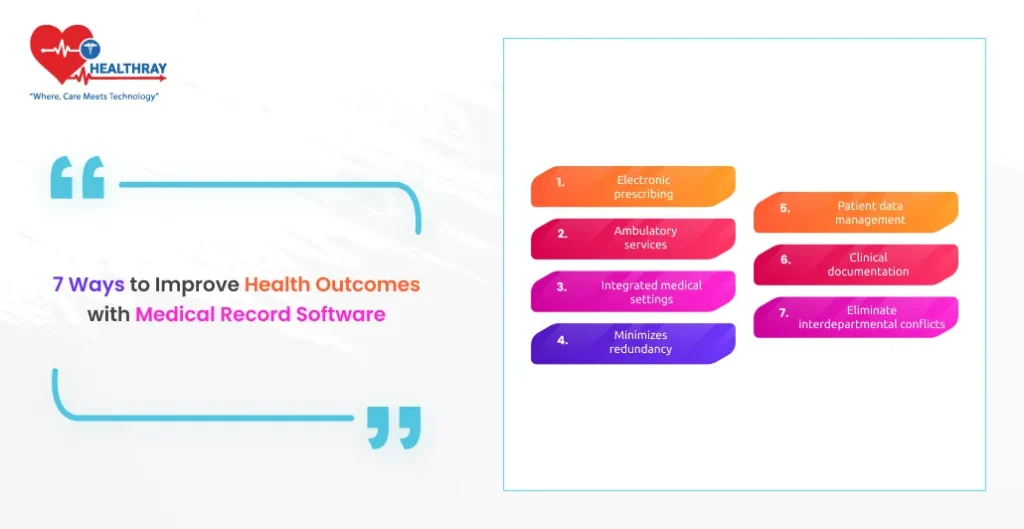
Medical record software is a leading tool for implementing the best patient care tools and lowers healthcare stress level. Furthermore, this software includes ready-made templates, record management tools, finance management tools, and imaging analysis tools. Electronic health records systems has the following ways to improve health outcomes :
Electronic prescribing
This splendid tool can save your energy, efforts, and enormous time. Furthermore, the prescriptions have a digitized format that cannot be misleading or stolen by anyone. On the other hand, patients feel relaxed by receiving a computerized prescription as it is stored automatically and reduces the need for placing it in a safe place. Electronic health records safely place information at a secure location. The advantages of electronic prescribing are :
- Preserve huge amount of time for patients
- Ease to diagnosis
- Improves healthcare practices
- Reduces medical errors
- Minimizes patients’ traveling costs.
Step towards digital era with our healthcare solution
Revamp your hospital facilities and embrace change for better healthcare management. Ease in managing and organizing large medical datasets leads to effective analysis. Seize the opportunity now!
Ambulatory services
It refers to patients receiving medical services outside of their healthcare premises. Moreover, they can take counsel or consult providers at any time. First, patients registered on the patient portal and can oversee the live physician list. Afterwards, they have many options to communicate with them like audio, video conferencing, and messages. Following are the benefits of ambulatory EMR services are :
- Minimizes patients medical costs
- Reduce crowd in hospitals
- Improve patient satisfaction
- Eradicate waiting time
- Mitigates costs.
Integrated medical settings
There are various healthcare stakeholders such as patients, doctors, third-party companies, and medical regularities. Furthermore, the health information technology inclusive of practice management tools can improve healthcare delivery and patient care. Additionally, it accumulates all healthcare stakeholders in an unified platform and can provide service from anywhere. The benefits of integrated medical systems are :
- Widened medical services
- Enhances accuracy
- Improve coordination
- Mitigates error
- Increases patient experience.
Minimizes redundancy
When you maintain a large data set, there is always a problem of replicating data that can cause irresistible issues. EHR systems apply powerful strategies to administrate healthcare information that eliminates duplicate entries and makes the data reliable. Moreover, duplicate entries occur errors in healthcare information and enhance information accurately. Following are numerous ways to minimizes redundancies including :
- Implementing modern data techniques
- Applying regulations
- Monitoring records
- Categorize information in high-end format
- Maintain data quality.
Patient data management
Maintaining healthcare tasks through digital platforms is an emerging practice. It is adopted by several medical practitioners. Furthermore, it consolidates data with patients’ confidential details. It can be fetched by any clinical workers or physician from their preferred location. This data has been protected with standard rules and managed effortlessly. Patient data management has numerous benefits including :
- Scrutinizing data easily
- Make spontaneous decision
- Improve interaction
- Increase patient safety
- Enhance efficiency.
Clinical documentation
It is under a protocol that clinical documents should be precise and accurate. Moreover, the electronic medical record software stores reliable information along with following protocols. Consequently, the records are authentic. The EMR software solution can appropriately maintain several documents such as patients’ medical history, consent forms, claims form, discharge form, and test results. The advantages of clinical documentation :
- Simplified claim procedure
- Enhances quality care
- Improves accuracy
- Increases efficiency
- Minimizes health costs.
Eliminate interdepartmental conflicts
Medical segments are of varied types such as accountancy segment for precisely administrated financial accounts, scheduling management department for managing appointment data, billing department for effortlessly paying medical invoices, inventory department for supervising healthcare stocks, out-patient department, managers segment, and in-patient department.
These departments are interlinked in an unified platform and contact them at another person’s convenient time. Consequently, they resolve issues instantly, conflicts would not arise, and train staff efficiently.
How to use Electronic Health Records to Improve Patient Engagement?
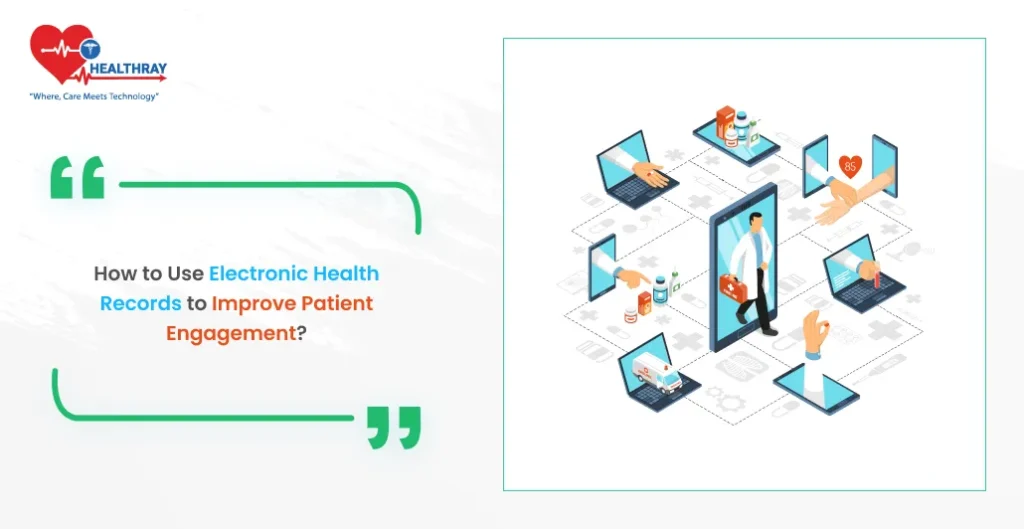
Electronic health records can keep the volume of medical figures without duplicate entries and any type of medical error. Health care providers can anytime earn income from remote medical consultation. Furthermore, the common functions of EMR systems are to maintain demographic information of medical personnel, combined patient information, medication management, and interoperability.
The EHR system can help to make quick decisions to remove varied risks, easily detect medical issues, managing healthcare stock, clinical decision support, and improve patient outcomes. Furthermore, it creates a better scenario for the healthcare industry from IPD management to ward management.
Developed patient portals for creating patient record systems, visualizing any old medical reports, and paying physicians. Ultimately, it empowers patients to supervise their health and make selective decisions.
Conclusion
Medical record software is an advanced tool for administering healthcare activities and it adopts current health trends. Furthermore, the importance of EMR solutions enhance healthcare delivery, improve financial outcomes, and quality management. Furthermore, varied ways to improve health outcomes with medical record software are e-prescribing, integrated medical settings, ambulatory services, patient data management, minimizes redundancy, clinical documentation, and eliminate inter-departmental conflicts. Consequently, it empowers patients about their health and intensifies healthcare revenue.
